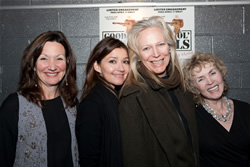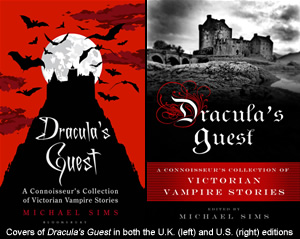A Valentine for Some Good Ol' Girls
What’s new in Tennessee books—and at Chapter 16—on February 18, 2010
 The official opening night of Good Ol’ Girls—a musical based on the stories of Jill McCorkle and former Nashvillian Lee Smith, with songs by Nashville hit-makers Marshall Chapman and Matraca Berg—was February 14, and it was a true Valentine to the four women who first began work on the project more than ten years ago. The show features “a quintet of Dixie divas,” according to a rave review in BackStage magazine, who are “post-feminist, post-redneck, and even post–steel magnolia.” In an interview with Fern Siegel at The Huffington Post, Lee Smith says the show’s characters understand “that big hair and a big heart do not mean a small mind.” And having a big heart doesn’t make a body a pushover, either: “You don’t want to cross a good ol’ girl,” Smith notes. “She’ll bring you a casserole, but she’ll kill you, too.”
The official opening night of Good Ol’ Girls—a musical based on the stories of Jill McCorkle and former Nashvillian Lee Smith, with songs by Nashville hit-makers Marshall Chapman and Matraca Berg—was February 14, and it was a true Valentine to the four women who first began work on the project more than ten years ago. The show features “a quintet of Dixie divas,” according to a rave review in BackStage magazine, who are “post-feminist, post-redneck, and even post–steel magnolia.” In an interview with Fern Siegel at The Huffington Post, Lee Smith says the show’s characters understand “that big hair and a big heart do not mean a small mind.” And having a big heart doesn’t make a body a pushover, either: “You don’t want to cross a good ol’ girl,” Smith notes. “She’ll bring you a casserole, but she’ll kill you, too.”
The definitive setting for killer writing is far from the Black Box Theatre in New York City, however: Killer Nashville—an annual conference for aspiring writers of thrillers, mysteries, suspense, and crime novels—will be held August 20-22. The keynote speaker this year will be Jeffery Deaver, internationally bestselling author of twenty-five novels, including The Bone Collector, which was made into a feature film starring Denzel Washington and Angelina Jolie. To learn more about the conference or to register before the early bird discount expires on February 28, click here.
By the end of the month, Memphis author Rebecca Skloot will be deep into her four-month book tour for The Immortal Life of Henrietta Lacks. The media coverage of this book, which entered The New York Times bestseller list at number five in its first week on shelves, has been intense. To help you keep track of it all, Chapter 16 will continually update this article with new links as Skloot crisscrosses the country, telling her story about an African American woman whose biopsy for cervical cancer launched the first immortal cell line in human history.
Michael Sims has another kind of immortality on his mind: he’s just completed the manuscript for Dracula’s Guest, a collection of Victorian-era vampire stories which he edited. Due in June, the collection is pulling in impressive blurbs: “Dracula’s Guest invokes the dangerous shadows of Victorian culture, those dark places where passion, terror, pathos, and sorrow mingle and merge,” writes Maria Tatar, a professor of folklore and mythology at Harvard. “Gathering together canonical works along with less familiar knock-out masterpieces, Michael Sims has produced an anthology designed to keep us all up at night.”
 The collection will be released simultaneously in this country and in Great Britain, but the book jackets are surprisingly different. “I resist making generalizations about one culture versus another, primarily because I don’t know what the hell I’m talking about, despite numerous trips to England,” Sims says. “I know this much: not only should books be judged by their cover, they’re designed to be judged by their cover. It may be that these differences reflect as much about individual designers as about anything truly cultural. And yet the British edition of Dracula’s Guest looks as stylized as Saul Bass’s poster for Vertigo, while the U.S. edition is a moody, atmospheric photo reminiscent of Nosferatu.” Ah, but which version is Sims’s favorite? “I can’t decide between them; I find that each charms a different part of my eye or brain,” he says diplomatically.
The collection will be released simultaneously in this country and in Great Britain, but the book jackets are surprisingly different. “I resist making generalizations about one culture versus another, primarily because I don’t know what the hell I’m talking about, despite numerous trips to England,” Sims says. “I know this much: not only should books be judged by their cover, they’re designed to be judged by their cover. It may be that these differences reflect as much about individual designers as about anything truly cultural. And yet the British edition of Dracula’s Guest looks as stylized as Saul Bass’s poster for Vertigo, while the U.S. edition is a moody, atmospheric photo reminiscent of Nosferatu.” Ah, but which version is Sims’s favorite? “I can’t decide between them; I find that each charms a different part of my eye or brain,” he says diplomatically.
It’s been a big week, too, for Clay Risen, author of A Nation On Fire and frequent Chapter 16 contributor: he’s got an article on the cover of the new issue of The Atlantic, and last week he started his new job as an editor on the op-ed page of The New York Times. It’s all a little daunting, he reports. “I feel a bit like a rube—the elevator button banks are all outside the doors, so you press your floor and a computer decides which elevator you’ll take. The window shades and lights operate automatically, working off photo-sensors. There’s a beautiful birch garden in the middle of the building, inaccessible to everyone but the gardeners. It’s all very bespoke and impressive and intimidating, frankly.”
Bestselling novelist Michael Connelly, who got his start as a crime-beat reporter, and David Maraniss, Pulitzer Prize-winning journalist at The Washington Post, talk with Chapter 16 this week about the necessity of newspapers like the Times. Look, too, for a Q&A with Nashville thriller-writer J.T. Ellison, as well as a review of a book about the surprising link between the Civil War and submarine technology: The H.L. Hunley by Knoxville historian Tom Chaffin. The Hunley was built, reviewer Chris Scott notes, “despite the concerns of some in the military that sneaking up on an enemy would be unethical.” It’s a history book indeed.